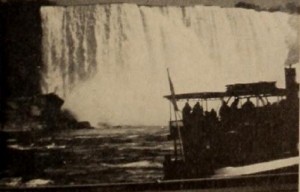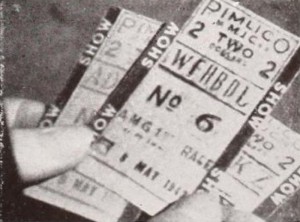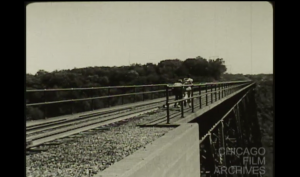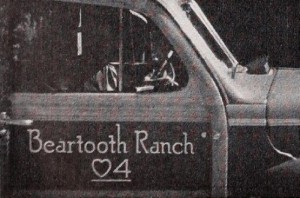
"In Tumbling Waters Leo J. Heffernan has turned his experienced and competent camera on that perennial favorite of travel filmers, Niagara Falls. The result is a sparkling piece of lighthearted showmanship, climaxed by a truly gripping and probably unique sequence filmed amid the swirling mists of the Cave of the Winds. The overall effect of Tumbling Waters, however, was marred for these reviewers by recurring levities of treatment deemed out of key with the essential majesty of the subject." Movie Makers, Dec. 1949, 471-472.

"In Turf Tales, Leonard Bauer, jr., has tackled an acceptedly difficult subject for the personal movie maker — and has done well by it. The subject, as might be guessed, is professional horse racing. The setting of Mr. Bauer's study is the relatively ancient track of Pimlico, outside Baltimore, with the climax of the picture provided by a record of its traditional classic, the Preakness. But the strength of Turf Tales derives more from its highly competent sequences of human interest behind the scenes — the early morning time trials, the stable boys and their chores, the track farrier as he shapes the delicate racing shoes and the strange, unexplained mascots of the high strung thoroughbreds. A commendably restrained narrative, set against a musical background, accompanies the film on a sixteen inch disc recorded by Mr. Bauer." Movie Makers, Dec. 1944, 496-497.

"A man pulls over to repair a flat tire on his car and is quickly ambushed and robbed by a passerby. The victim regains consciousness and soonafter chases the robber up onto a train overpass where the two battle it out." Chicago Film Archives
"TV You'll See in 83' is a club production and observes that the commercials on TV are getting more numerous all the time. Pretty soon, says the film, they'll squeeze out all program material and TV will be one long string of commercials from morning to night. How will these commercials hold the viewer's interest? The Toronto club gives several examples" PSA Journal, Sept. 1964, 51.
"Flaherty's New York film is a negotiation of modern urban culture (the city) by a filmmaker whose interests had primarily been of the exotic, the folk, the ancient cultures" (Tepperman 32).

"Two Dudes In Montana, by Lester F. Shaal, is an engaging and altogether competent record of a dude ranch vacation. In it, two attractive Eastern youngsters are seen adapting themselves with enthusiasm to the strange and stimulating adventures of Western ranch life. Developing his theme deliberately and in carefully integrated continuity, Mr. Shaal shows his tenderfeet taking to the saddle for safaris which progress from an afternoon's outing to full scale pack trips into the high mountains. The producer brings to this subject matter a fine technical skill with movie tools which has long been his. New and rewarding in his present work is an evolving eye for the appeal of human interest." Movie Makers, Dec. 1948, 496.
Total Pages: 299